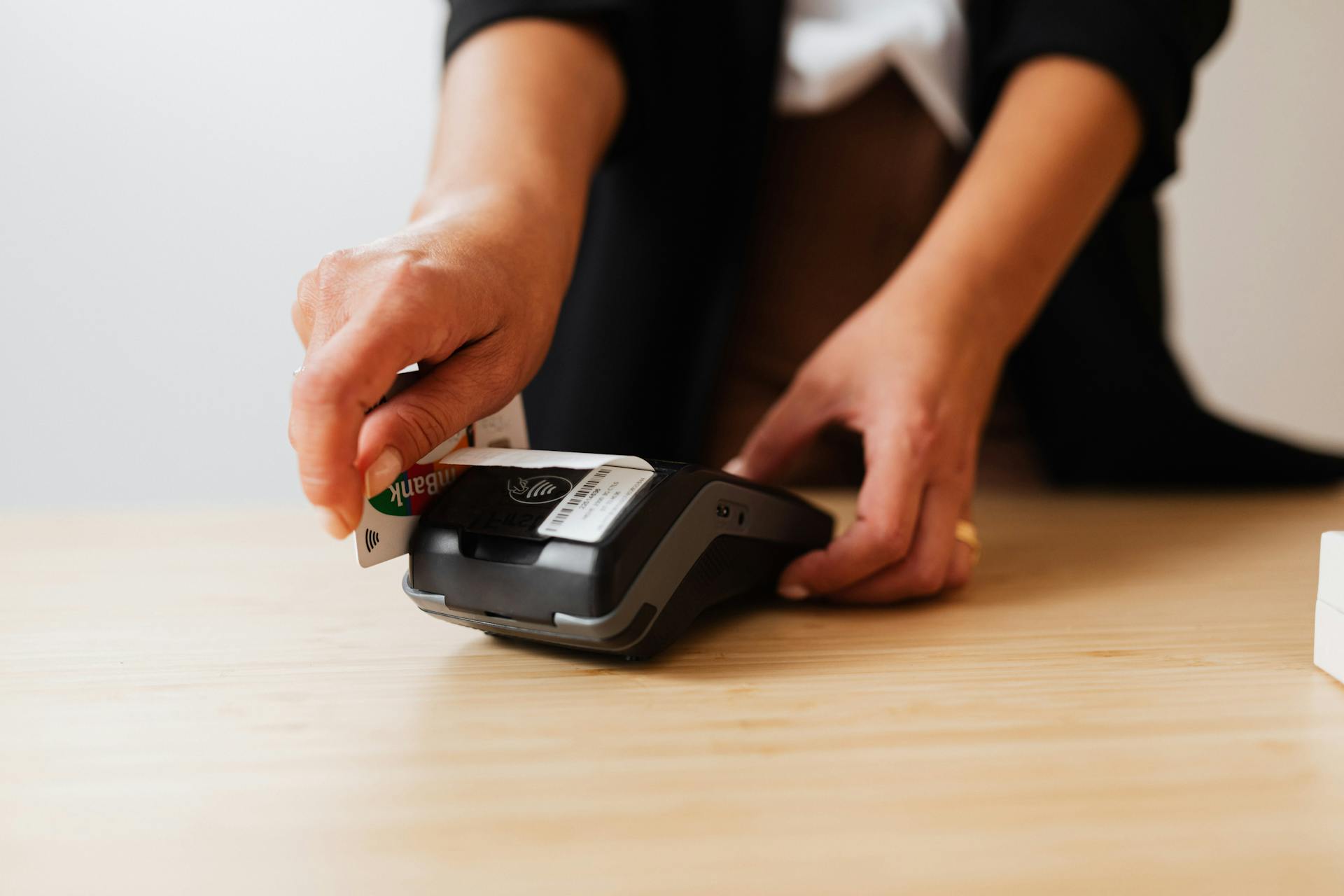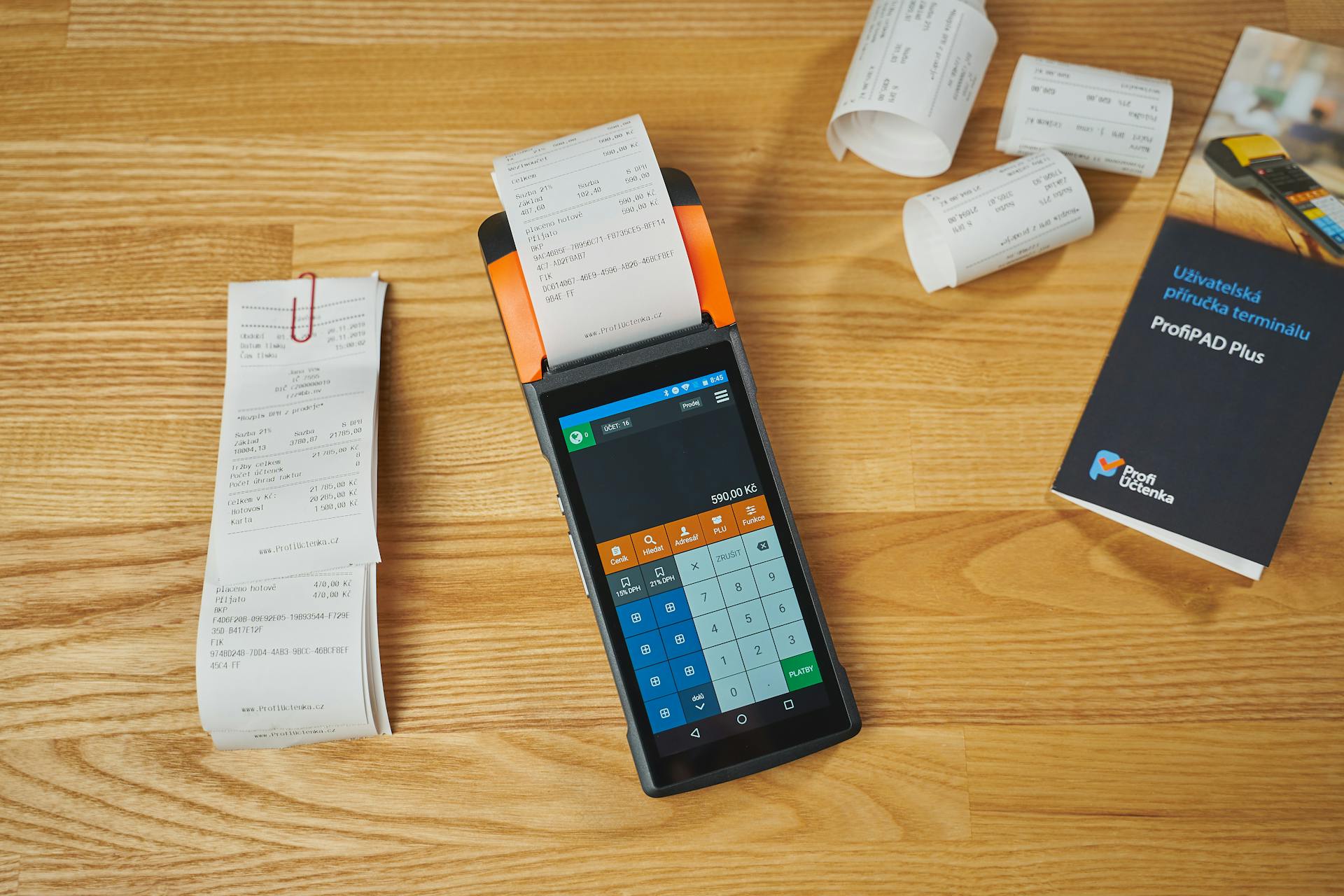
A credit card merchant account is a type of bank account that allows businesses to accept credit card payments from customers.
To process credit card transactions, merchants need to have a merchant account with a bank or a payment processor. This account holds the funds from credit card sales until the merchant can deposit them.
The processing fee for credit card transactions typically ranges from 1.5% to 3.5% of the transaction amount, plus a small flat fee.
Credit Card Processing Basics
Credit card merchant account processing can seem like a mysterious process, but it's actually quite straightforward once you understand the basics. The major players in credit card merchant processing services are the customer, the merchant, the issuing bank, the acquiring bank, the payment gateway, the payment processor, and the card network or card association.
The public-facing side of accepting credit cards for payment is simple, but the back end of merchant account credit card processing is more complex. For a retail employee, the only thing to watch out for is a denied transaction.
See what others are reading: Can You Undo Credit Card Payment to Bank Account

To facilitate sales, merchants need to accept card payments, which is why merchant credit card processing exists. The customer uses their card to make a payment, starting the processing workflow.
The acquiring bank maintains the merchant's account and allows the merchant to accept credit card and debit card payments. They sometimes outsource the management of merchant accounts to membership service providers and independent sales organizations.
Here is a breakdown of the major players in credit card merchant processing services:
- The customer: the cardholder who uses their card to make a payment.
- The merchant: the business that accepts card payments to facilitate sales.
- The issuing bank: the customer's bank, which issued the card used to make the payment.
- The acquiring bank: the merchant bank that maintains the merchant's account and allows them to accept card payments.
- The payment gateway: the entity that keeps payment data safe as it passes from the merchant to the processor.
- The payment processor: the entity that receives authorization requests and passes them along to card networks and issuing banks.
- The card network or card association: the entity that connects issuing and merchant banks, facilitates transactions, and settles disputes.
Core Parties in Credit Processing
Credit card merchant account processing involves several key parties that work together to facilitate a transaction. The customer is a cardholder who initiates the transaction with their payment card.
The merchant is the business that accepts card payments to facilitate sales. They need to have a merchant account to process these transactions.
The issuing bank is the customer's bank, which issued the card used to make the payment. This bank verifies the customer's account balance and ensures the customer has sufficient funds to cover the transaction.
Readers also liked: Entered Wrong Account Number for Credit Card Payment

The acquiring bank, also known as the merchant bank, maintains the merchant's account and allows them to accept credit card and debit card payments. This bank settles the transaction with the issuing bank.
The payment gateway keeps payment data safe as it passes from the merchant to the processor. It's like a secure tunnel that protects sensitive information.
The payment processor receives authorization requests, passes them along to card networks and issuing banks, and then returns the result to the merchant. This processor is like a messenger that delivers the transaction data between parties.
The card network or card association connects issuing and merchant banks, facilitates transactions, and settles disputes between those banks. They also set interchange rates, which determine the fees associated with a transaction.
Here's a breakdown of the core parties involved in credit processing:
- Customer (cardholder)
- Merchant (accepts card payments)
- Issuing bank (customer's bank)
- Acquiring bank (merchant bank)
- Payment gateway (keeps payment data safe)
- Payment processor (receives and delivers transaction data)
- Card network or card association (connects banks, facilitates transactions)
Credit Processing Workflow
The credit processing workflow is a crucial part of the credit card merchant account process. It involves three main categories: Authorization, Clearing, and Settlement.

Authorization begins when a customer uses a credit or debit card to make a payment. The request for payment authorization moves from the merchant to payment gateway, which then passes to the payment processor.
The card network passes the request to the issuing bank, where approval or denial of the transaction actually takes place. The issuing bank ensures the card is active, valid, and has the needed available funds.
Approved transactions are then processed through Clearing and Settlement. Merchants generally batch transactions together for more efficient processing. Each batch passes to the payment processor, and then to the card network.
At this point, the issuing bank actually charges the customer’s account. The money then moves to the acquiring bank and the specific merchant account. The card network facilitates this process.
The merchant account provider settles the transaction by depositing funds into your company’s bank account. It will also take a transaction fee—typically 3% to 5% of the total amount. Deposits don’t happen as soon as a transaction goes through, instead, they’re processed in batches toward the end of the working day or week.
For more insights, see: Merchant Bank Id Credit Card Authorization
Payment Processing Options

Accepting credit cards is necessary for every business. You can do this with a merchant account, which acts as a bridge between your bank account and the customer's card issuer.
Merchant accounts are available through acquiring banks, but be aware that all of them charge transaction fees. Research is key to finding the right account type and pricing structure for your store.
Shopify Payments offers an integrated payment solution that eliminates the need for a lengthy third-party activation process.
Online Processing
Online processing is a must for every business, as it allows customers to pay quickly and securely online.
Accepting credit cards online is a necessity, but choosing the right online credit card processing company can be a difficult task.
We offer innovative and secure services that are specifically designed to meet the business needs of e-commerce merchants, making it easier to accept credit cards online quickly and securely.
For e-commerce businesses, an ecommerce merchant account is necessary to support online checkout for customers, but be aware that these accounts may charge higher transaction fees.
Expand your knowledge: Credit Card Size Business Cards

A merchant account acts as a bridge between your bank account and the customer's card issuer, settling your sales so you don't have to wait for customers to pay their credit card bills.
Transaction fees are charged by all acquiring banks for running a merchant account, so it's essential to do your research to find the right account type and pricing structure for your store.
Using an integrated payment solution like Shopify Payments can save you time and money, as it eliminates the need for a separate application process and third-party fees.
Shopify Payments comes with your Shopify plan, making it easy to start accepting payments fast and go from setup to selling in one click.
Discover more: Why Do Credit Card Payments Take so Long to Process
Mobile
If your business is on the move, you'll need a mobile merchant account to process credit card payments. This type of account pairs with cellular processing equipment or smartphone apps.
As a florist or food truck owner, you can use a mobile merchant account to accept credit card payments from customers wherever you are.
Risk and Security

Payment gateways act like a bridge that integrate online card processing capabilities with your business operations, reducing the likelihood of fraud and theft. That means a more secure checkout experience for you and your customers.
This secure processing is crucial because it reduces the likelihood of fraud and theft.
Risk Levels
Paycron offers flexible payment processing solutions with no restrictions, catering to low, medium, and high-risk accounts.
Low-risk accounts can thrive with Paycron's services, which provide simple and affordable merchant accounts that take the business to upscale heights in no time.
Medium-risk accounts can benefit from Paycron's collaboration with leading merchant acquiring banks, taking their online business to the global level.
High-risk accounts can still opt for services through Paycron, receiving significant benefits like multi-currency payments.
Paycron's flexible solutions make it possible for e-commerce businesses to receive payments without being restricted by domestic banks.
Recommended read: Discover Business Credit Card Requirements
Creditworthiness
Your creditworthiness can significantly impact your ability to obtain a dedicated credit card processing merchant account. If your business is very new or has a less than stellar credit history, you may need to consider an aggregated merchant account instead.

Underwriting for dedicated merchant accounts is typically more rigorous than for aggregated accounts. This means you'll need to provide more information about your business.
The actual credit card processing rates you'll be charged are also a crucial factor. However, be wary of choosing a low rate without considering how the provider will impact your overall business.
Readers also liked: How to Link Chase Business Credit Card to Personal Account
Secure
Payment gateways act like a bridge that integrate online card processing capabilities with your business operations, reducing the likelihood of fraud and theft.
This secure integration is a game-changer for businesses, providing a more secure checkout experience for customers.
Types of Merchants
There are different types of merchant accounts that cater to the specific needs of businesses.
You can choose a merchant account that best fits your business type. For example, if you're an e-commerce business, you'll need a merchant account that can handle online transactions.
Some businesses may require a high-risk merchant account, which is designed for industries with higher chargeback rates or other payment processing risks.

High-risk businesses may include industries like adult entertainment, travel, or online pharmaceuticals.
A regular merchant account, on the other hand, is suitable for low-risk businesses with stable payment processing histories.
This type of account is often used by brick-and-mortar stores, restaurants, and service-based businesses.
Each type of merchant account has its own set of benefits and drawbacks, so it's essential to choose the right one for your business needs.
Worth a look: Is a Credit Account a Type of Financial Accounts
Opening and Configuring an Account
To open a merchant account, you'll need to organize the necessary documents, which typically include your business information, contact details, and financial statements. This information will be used to evaluate your business's creditworthiness.
You'll also need to provide your business license, as this is required to open a merchant account. If you're already using a credit card processing tool, be sure to share this information with your merchant account provider to speed up the approval process.
To apply for a merchant account, you'll need to submit your application, which may involve paying an application fee. Be sure to include a cover letter explaining your business and why you need a merchant account. The merchant account provider will review your application and consider factors such as your business's length of time in operation, personal and business credit history, and type of business.
Here are the key factors considered by the merchant account provider:
- The length of time you have been in business
- Personal and business credit history
- If you have had a merchant account in the past
- Your type of business
What Is an Account?

An account is a way for businesses to manage their finances and accept payments.
A merchant account is specifically designed for accepting credit card payments.
It's like a business bank account that helps reduce payment delays by communicating with the card issuer.
You can open a merchant account with an acquiring bank if you have a business license.
Gain Approval and Configure
A merchant account provider will check your risk level before approving your application. They consider the length of time you've been in business, personal and business credit history, past merchant account history, and your type of business.
Your business is considered less risky if you process transactions in person rather than online or via phone. Online transactions are more susceptible to fraud.
To lower risk, the merchant account provider may seek address verification. If you fall into its low-risk category, the provider will approve your application.
The processor may approve riskier applications but at a higher fee. You may also have to pay an application fee to your merchant account provider.
For your interest: Credit Cards That Approve with No Credit

Remember to include a cover letter along with your application stating what your business does and why you require a merchant account.
Here are the criteria the merchant account provider will consider:
- The length of time you have been in business
- Personal and business credit history, to check for any defaulted payments or if you were ever bankrupt
- If you have had a merchant account in the past
- Your type of business
After approval, you'll need to set up your account. This involves organizing your necessary documents and following the steps outlined in the application process.
Organize Documents
To open and configure an account, you'll need to gather a variety of documents.
You'll need to provide your business information, including the name of your company and contact details.
The amount of time you've been in business will also be required.
Bank account details and financial statements are also necessary.
If you're already using a credit card processing tool, share this information with your merchant account provider to ensure fast approval.
Pricing and Fees
Merchant account fees can be confusing, but understanding the basics can save you money and headaches. There are three main pricing models: flat-rate pricing, tiered pricing, and other costs and fees.

Flat-rate pricing is one of the most common models, where you pay a fixed fee per transaction, ranging from 0.5% to 5% of the transaction amount, plus 20¢ to 30¢ per transaction. This structure is useful for businesses with low sales volume.
Tiered pricing, on the other hand, charges a fee depending on the type of card used and the total volume of transactions. Qualified transactions get the best rates, while non-qualified transactions are charged the highest rates.
Be aware of hidden fees, such as cancellation fees, early termination fees, PCI non-compliance fees, chargeback fees, account change fees, and equipment rentals. These fees can add up quickly and are often charged separately from your processing fee.
Here are some common flat-rate pricing examples:
Compare multiple vendors and price out what a typical day of sales and transactions might look like to avoid unexpected fees.
Integrations and Volume
As your business grows, you'll need a credit card merchant account provider that can keep up with the increased processing volume. Choose a provider with the ability to process an unlimited number of transactions without hitting you with fees or limits.
Some providers offer processing fee discounts for high-volume businesses, which can be a major cost-saver.
Onshore & Offshore Services

Many e-commerce merchants face difficulties when trying to find good credit card processing services.
At Paycron, we can help by introducing you to major foreign banks that have fewer trading restrictions. These banks invite applications from players no matter your industry is considered low, mid, or high risk.
We make it easier for you to complete the entire process. Our large network opens your company to a number of leading merchant acquiring banks.
Integrations
Integrations are a crucial aspect of a merchant account, and it's essential to find out what integrations the merchant account supports.
For instance, with Shopify and Stripe, you can instantly get end-to-end merchant account solutions and reap the benefits of payment gateway and merchant account functionalities combined.
Some merchant accounts offer flexibility for your storefronts and customers, allowing you to tailor your payment solutions to meet their specific needs.
This flexibility is a significant advantage, especially if you have multiple storefronts or a large customer base.
Check this out: Credit Card Payment Not Showing up in Bank Account
Volume

As your business grows, you'll need a payment provider that can keep up with the demand. Choose a provider with the ability to process an unlimited number of transactions and dollar volume without hitting you with fees or limits.
Some providers offer processing fee discounts for high-volume businesses, which can be a huge cost-saver. Your business deserves a payment provider that can scale with you.
Choosing a Processor
Determine your business's needs before selecting a payment processor. This includes considering the type of card brands you accept, your transaction volume, and the products you sell.
To ensure the best possible price, shop around and ask for quotes from multiple providers. Clarify the processing fee structure and compare it to the average credit card processing fees.
When evaluating a provider, check if they integrate with the software you use in your business operations, such as accounting, website maintenance, or customer relationship management. This will save you time and effort in the long run.
Here are some key factors to consider when choosing a payment processor:
- Type of card brands accepted
- Transaction volume
- Products sold
- Integration with business software
Evaluating customer reviews can also give you insight into the provider's customer support team and responsiveness. Look for reviews on review sites to get a sense of their dedication to their customers.
Does My Business Need a Processor?
Having a payment processor is crucial for accepting debit or credit card payments.
A payment processor has a connection to a merchant account, which is necessary for storing transaction funds until settlement.
Without this connection, your processor wouldn't have a designated account to store transaction funds, increasing liability in the event of chargebacks, fraud, and other issues.
This setup protects your business from potential financial losses and ensures a smoother payment processing experience.
Finding the Best Processor for Your Business
First, determine your business's needs, including the type of card brands you accept, your transaction volume, and the products you sell.
You'll want to shop around to ensure the best possible price, so ask for quotes from multiple providers and clarify their processing fee structure. Compare it to the average credit card processing fees to get a sense of what you're getting into.
Make sure your potential provider integrates with the software you use in your business operations, such as accounting, website maintenance, or customer relationship management.
Check review sites to evaluate customer reviews and get a sense of how responsive and dedicated the customer support team is.
Assess whether you need any added services, such as chargeback or fraud protection, and see if your provider offers them or can refer you to a third-party solution.
Here are some key questions to ask your potential provider:
- What is your processing fee structure?
- Do you integrate with my existing business software?
- What kind of customer support can I expect?
- Do you offer any added services, such as chargeback or fraud protection?
Frequently Asked Questions
How long does a merchant have to process a credit card transaction?
Typically, credit card transactions take 48 hours to settle, but processing times can vary depending on the card issuer. This delay can be shorter for online payments, usually clearing within 1-3 days
Sources
- https://www.swipesum.com/insights/the-basics-of-merchant-credit-card-processing
- https://www.paycron.com/merchant-services
- https://www.shopify.com/retail/merchant-account
- https://paysimple.com/blog/credit-card-processing-4-key-points-to-consider-when-choosing-between-a-dedicated-or-aggregated-merchant-account/
- https://paymentcloudinc.com/blog/merchant-account-vs-payment-processor/
Featured Images: pexels.com


